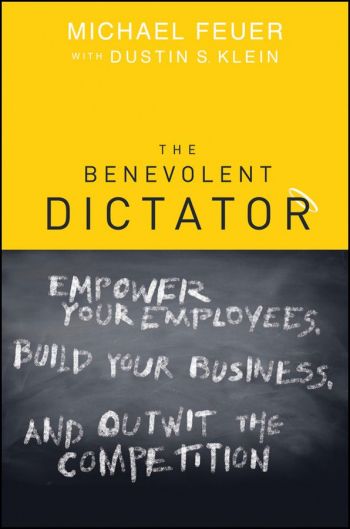Book Review: When
Book Review: Lessons that Office Max chief learned as he built a company from a concept
- |
- Written by Greg Patton
- |
- Comments: DISQUS_COMMENTS
 The Benevolent Dictator: Empower Your Employees, Build Your Own Business, And Outwit The Competition, by Michael Feuer with Dustin S. Klein, John Wiley & Sons, Inc., 264 pp.
The Benevolent Dictator: Empower Your Employees, Build Your Own Business, And Outwit The Competition, by Michael Feuer with Dustin S. Klein, John Wiley & Sons, Inc., 264 pp.
Michael Feuer is not a household name, though you likely know of his corporate roots. The success in management that he relates some of the secrets of are embodied in two names that gain good recognition from most Americans.
So the big stage for our self-proclaimed dictator came from the creation, development, capitalization, and execution of the Office Max brand. This idea was developed, and its first store opened in, the suburbs of Cleveland, Ohio. In a two-decade run under Feuer, it became one of the mega-office-products-retailers of the nation. It is this business success that gives rise to Feuer’s ideas and experiences as The Benevolent Dictator.
If you love metaphors--and especially mixed ones--this is the management book for you. The reader will not likely be riveted by the flow of the prose contained in The Benevolent Dictator. But there is some meat here.
Feuer’s exceptional energy and bravado comes shouting through, as the book’s four phases and 40 chapters jump from idea to idea.
This read is more reminiscent of flipping through a box of management memos rather than a smoothly delivered development of a central business concept. In spite of the title, it is not the story of a conquering business hero. It is the collection of ideas and thoughts that the central character carries around with him.
Don’t let the excessive use of metaphor and simile distract you from the wisdom gained by a leader who took his company from idea to national player with “OPM.” As this acronym is symbolic throughout the book, I’d best define it. “OPM” is the author’s shorthand for “Other People’s Money.” Feuer returns often to the need of capital acquisition as he develops Office Max and then his subsequent effort, Max Wellness, a chain of health products stores.
As the title suggests, the author sees his role, as a business leader, as making the tough decisions needed in the development of a company. His point: Sometimes those decisions require tyrannical obsession.
But as is required in the modern work environment, a benevolent approach to such execution is Feuer’s style of choice. He suggests that the book is “a hands-on digest that uses proven street-fighter methods to build a business from scratch.”
The chapters or “Lessons” as they are titled in the book are quick bursts of business energy. The Lesson titles (chapter headings) have a Chinese fortune cookie ring to them and the content of the lesson may or may not actually remain faithful to the chapter’s title.
Here are some examples of the headings:
• “It’s better to be lucky than just good.”
• “Treat an idea like clay.”
• “Never be as weak as your weakest link.”
• “Don’t drink your own bathwater--you could choke.”
• “Spurring growth—how to eat an elephant one bite at a time.”
What you will find are the lessons that Feuer learned or absorbed through the development of his companies. Most of them will have familiar flavor; they are common posits that have imbedded themselves into the author’s work lexicon. I am confident that this is the translation of how the author thinks. These are the concrete statements of the vague, gut level, concepts driving the “dictator” as he developed each new entity.
The author touches on risk management in a section describing a contract with Gateway Computers.
The original Office Max model called for the sale of personal computers.
As Feuer writes, “In 1996 and 1997 we were losing money on many of the computers that we sold because we were selling them at cost or below. But we wised up and became the first retail chain to bite the bullet and actually get out of the computer business for about a year. As a result, Wall Street hailed our decision, despite its unpopularity with vendors and consumers. Vendors hated our move because we dried up a lot of business we’d been doing with them. But that wasn’t the end of the story. I took a step back and viewed our mistake through a different lens---by asking myself how we could turn a negative into a positive. And so we did.”
After evaluating the risks Feuer took a different tack. This risk analysis gave way to a concept of Gateway Computer leasing space within Office Max retail stores and paying rent instead of simply being another vendor to the office supply giant. In the end, the shift didn’t work for Gateway.
Ultimately, Feuer believes that Gateway failed in their plan because they “got hooked on sales rather than focusing on profits and suffered the ultimate consequences.” Office Max collected their contractual fixed rents and Gateway suffered the losses associated with the failure.
The reader will likely be reminded throughout the pages of the book of thoughts, ideas, or concepts that are solid building blocks to any business endeavor.
I found identity with Feuer’s statement, “It’s imperative to listen to what your customers are really saying when they tell you what they want from your business. You must learn how to think like your customers and see things through their eyes, not just yours.”
That is the kind of reminder that make a reading of this book worthwhile.
Want more banking news and analysis?
Get banking news, insights and solutions delivered to your inbox each week.
Tagged under Books for Bankers,













